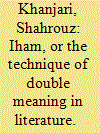|
|
|
Sort Order |
|
|
|
Items / Page
|
|
|
|
|
|
|
| Srl | Item |
| 1 |
ID:
192994


|
|
|
|
|
| Summary/Abstract |
This article examines the chapter on īhām (literary amphiboly) in Ḥadāʾiq al-Siḥr by Rashīd Vaṭvāṭ (d. 1182). Ḥadāʾiq, a treatise on stylistics with Persian and Arabic examples, is the oldest extant document to define īhām. Vaṭvāṭ's definition of īhām sheds light on the mechanism and function of this literary technique. This article argues that īhām, according to Vaṭvāṭ, operates through the creation of semantic fields and defamiliarization. Previous scholars who examined this chapter of Ḥadāʾiq, oblivious to this point, have made a number of misinterpretations. However, by analyzing the name he prefers for this figure of speech, the definition he gives, and the examples he cites to explain it, this article demonstrates that Vaṭvāṭ had this function of defamiliarization in mind.
|
|
|
|
|
|
|
|
|
|
|
|
|
|
|
|
| 2 |
ID:
163841


|
|
|
|
|
| Summary/Abstract |
Shakespeare's The Merchant of Venice has been reimagined, adapted, and appropriated by Arab playwrights and poets. The Arab Jordanian poet ʿArār (Mustafa Wahbi Al-Tal; 1897–1949) appropriates Shakespeare's anti-archetype of the figure of the Jew, Shylock, to criticize two local issues in the early twentieth-century context in Jordan and Palestine. First, the phenomenon of money-lending by Jordanian merchants, which led to the confiscation of the poor peasants' lands in the early twentieth century. Second, the condemnation of Zionism and its association with Western colonialism. Shakespeare's Shylock, on one hand, is recreated as a Jordanian Shylock, who is a usurer, and, on the other, as a Zionist Shylock. This remoulding of Shakespeare's Shylock as an Arab and Zionist reveals the post-Shakespeare Arab audience's new perception of The Merchant of Venice as a play about the political and behavioral affiliations of Shylock rather than about his Jewish ethnicity.
|
|
|
|
|
|
|
|
|
|
|
|
|
|
|
|
|
|
|
|
|